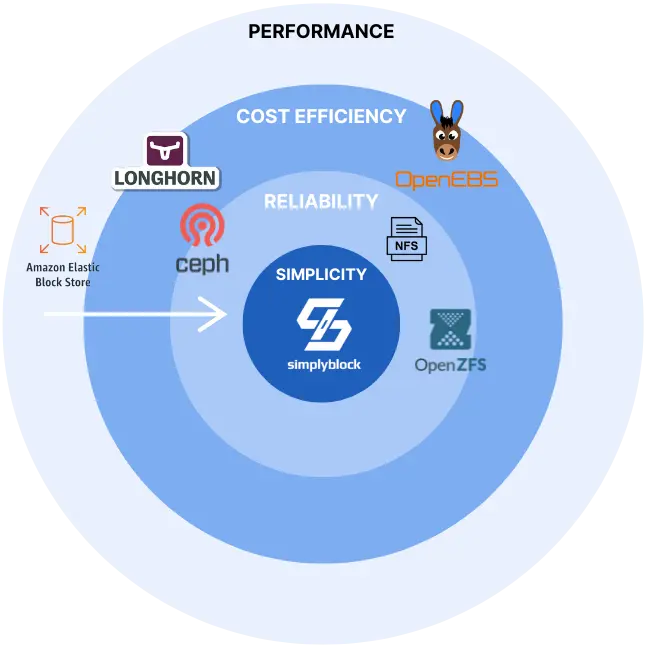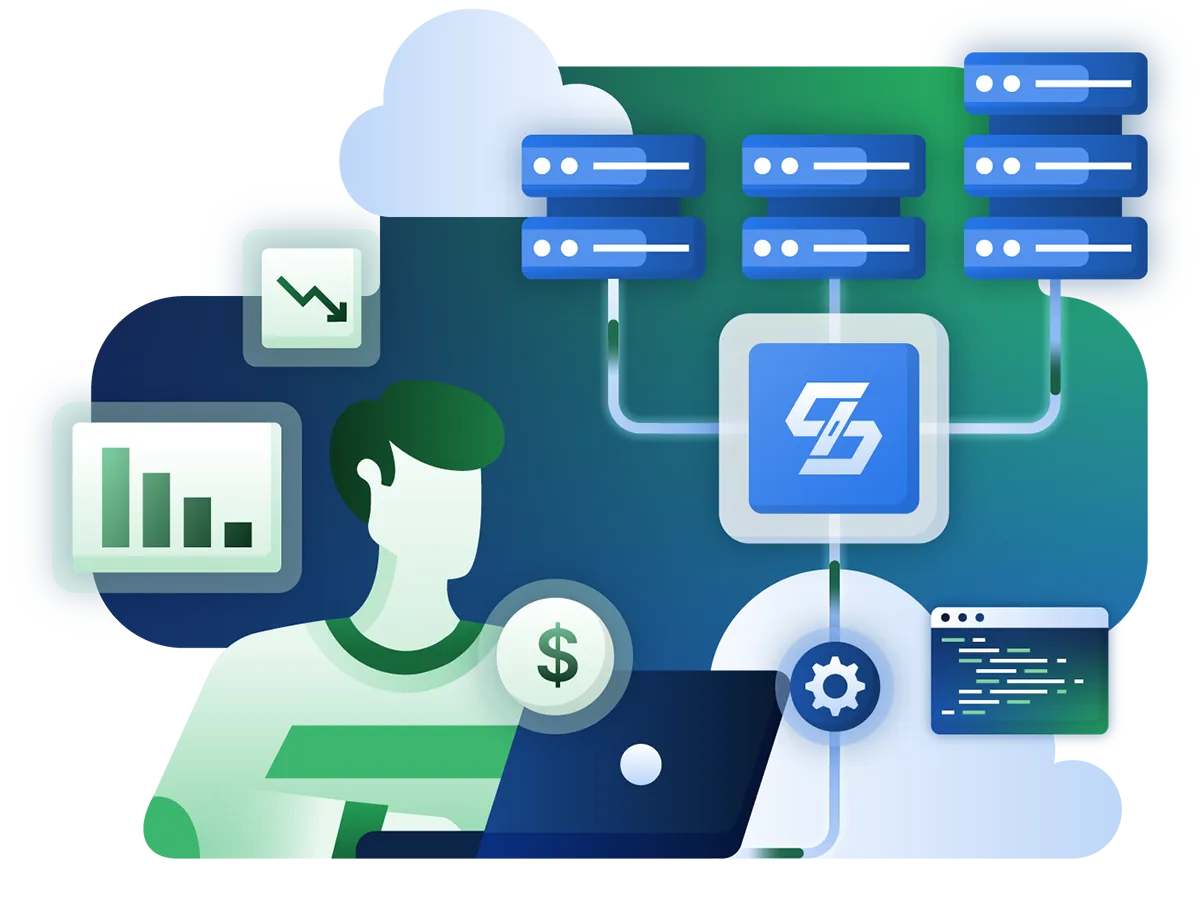Dell PowerFlex Alternative
Streamlined Storage for Agile Infrastructure
PowerFlex offers robust performance but often comes with high costs, complex setups, and vendor lock-in. Simplyblock provides a flexible, software-defined storage solution that simplifies operations and reduces total cost of ownership (TCO), making it ideal for dynamic, modern workloads. With native support for NVMe and multiple deployment options, Simplyblock adapts seamlessly to evolving infrastructure needs.

The Limits of PowerFlex in Practice
Setup Is Complex
Deploying and managing PowerFlex requires expertise, slowing down infrastructure agility and responsiveness.
High Ownership Costs
Licensing fees and specialized hardware make PowerFlex costly to scale and maintain for most growing teams.
Scaling Lacks Flexibility
Compute and storage cannot be scaled independently, limiting optimization across diverse and evolving workloads.
Tied to a Single Vendor
Heavy integration with Dell’s stack increases lock-in risk and reduces options for future portability.
Built to Adapt, Not Constrain
Simplyblock supports hyperconverged, disaggregated, and hybrid deployments with ease. Its flexible model scales storage and compute independently. PowerFlex, by contrast, often forces rigid setups that limit agility in evolving environments.
🔧 Flexible Deployment for Any Environment
Simplyblock gives you the freedom to deploy storage exactly how your infrastructure demands—whether hyperconverged, disaggregated, or hybrid. It allows storage and compute to scale independently without architectural lock-ins.
PowerFlex, in contrast, often forces rigid setups that limit adaptability. This slows down how quickly teams can respond to changing resource and workload needs.


🧱 Architecture Built for Modern Workloads
Engineered for NVMe and cloud-native stacks, Simplyblock combines a lightweight, software-defined core with erasure coding and built-in QoS. Its architecture minimizes complexity while enabling performance at scale.
PowerFlex, however, leans on proprietary tools and limited container support. This makes scaling and integration harder in fast-moving, modern environments.
🎯 Why Simplyblock Is a Better Fit
Cost Efficiency
Cuts TCO by using standard hardware and removing expensive contracts, licensing, and vendor-imposed rules.
Deployment Flexibility
Deploy in any setup—hyperconverged, disaggregated, or hybrid—and scale compute the way you need.
Enhanced Data Protection
Protects data with erasure coding and self-healing, keeping workloads resilient without storage waste.
Simplified Management
Reduces manual work with automated storage workflows and clean interfaces for teams running critical systems.
Simplyblock Compared to Dell PowerFlex
| Simplyblock | Dell PowerFlex | Details | |
|---|---|---|---|
| Hardware Independence |
|
| Run on any x86 or ARM64 hardware, no vendor lock-in or proprietary systems. |
| Multi-Tenant QoS |
|
| Guarantees IOPS, latency, and bandwidth per tenant or workload. |
| Kubernetes-Native Integration |
|
| Built from the ground up to support containerized environments. |
| Simplified Management |
|
| Offers a streamlined UI and automation to reduce storage admin overhead. |
| Hardware Independence | |
|
Simplyblock
|
|
| Run on any x86 or ARM64 hardware, no vendor lock-in or proprietary systems. | |
| Multi-Tenant QoS | |
|
Simplyblock
|
|
| Guarantees IOPS, latency, and bandwidth per tenant or workload. | |
| Kubernetes-Native Integration | |
|
Simplyblock
|
|
| Built from the ground up to support containerized environments. | |
| Simplified Management | |
|
Simplyblock
|
|
| Offers a streamlined UI and automation to reduce storage admin overhead. | |
| Simplyblock | Dell PowerFlex | Details | |
|---|---|---|---|
| NVMe-over-TCP Support |
|
| Uses modern NVMe/TCP protocol for ultra-low latency and high throughput. |
| Sub-Millisecond Latency |
|
| Achieves consistent 0.1ms latency with SPDK-based architecture. |
| NVMe-over-TCP Support | |
|
Simplyblock
|
|
| Uses modern NVMe/TCP protocol for ultra-low latency and high throughput. | |
| Sub-Millisecond Latency | |
|
Simplyblock
|
|
| Achieves consistent 0.1ms latency with SPDK-based architecture. | |
| Simplyblock | Dell PowerFlex | Details | |
|---|---|---|---|
| Advanced Erasure Coding |
|
| Protects data with minimal overhead, unlike traditional RAID setups. |
| Self-Healing Architecture |
|
| Automatically detects and recovers from node or disk failures. |
| Low RPO Disaster Recovery |
|
| Supports near-zero RPO with continuous write-ahead logging. |
| Advanced Erasure Coding | |
|
Simplyblock
|
|
| Protects data with minimal overhead, unlike traditional RAID setups. | |
| Self-Healing Architecture | |
|
Simplyblock
|
|
| Automatically detects and recovers from node or disk failures. | |
| Low RPO Disaster Recovery | |
|
Simplyblock
|
|
| Supports near-zero RPO with continuous write-ahead logging. | |
| Simplyblock | Dell PowerFlex | Details | |
|---|---|---|---|
| Low Total Cost of Ownership |
|
| Uses commodity hardware and efficient software to reduce spend. |
| Automated Storage Tiering |
|
| Moves cold data to cheaper storage tiers without manual steps. |
| Low Total Cost of Ownership | |
|
Simplyblock
|
|
| Uses commodity hardware and efficient software to reduce spend. | |
| Automated Storage Tiering | |
|
Simplyblock
|
|
| Moves cold data to cheaper storage tiers without manual steps. | |
| Simplyblock | Dell PowerFlex | Details | |
|---|---|---|---|
| Hardware Independence |
|
| Run on any x86 or ARM64 hardware, no vendor lock-in or proprietary systems. |
| Multi-Tenant QoS |
|
| Guarantees IOPS, latency, and bandwidth per tenant or workload. |
| Kubernetes-Native Integration |
|
| Built from the ground up to support containerized environments. |
| Simplified Management |
|
| Offers a streamlined UI and automation to reduce storage admin overhead. |
| Simplyblock | Dell PowerFlex | Details | |
|---|---|---|---|
| NVMe-over-TCP Support |
|
| Uses modern NVMe/TCP protocol for ultra-low latency and high throughput. |
| Sub-Millisecond Latency |
|
| Achieves consistent 0.1ms latency with SPDK-based architecture. |
| Simplyblock | Dell PowerFlex | Details | |
|---|---|---|---|
| Advanced Erasure Coding |
|
| Protects data with minimal overhead, unlike traditional RAID setups. |
| Self-Healing Architecture |
|
| Automatically detects and recovers from node or disk failures. |
| Low RPO Disaster Recovery |
|
| Supports near-zero RPO with continuous write-ahead logging. |
| Simplyblock | Dell PowerFlex | Details | |
|---|---|---|---|
| Low Total Cost of Ownership |
|
| Uses commodity hardware and efficient software to reduce spend. |
| Automated Storage Tiering |
|
| Moves cold data to cheaper storage tiers without manual steps. |
